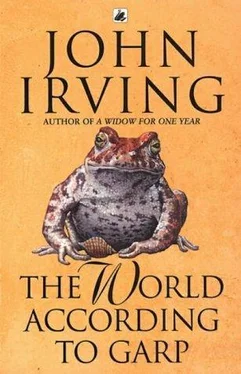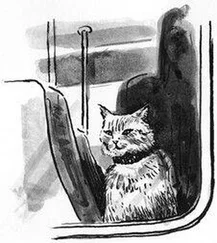“And the cafй owner?” Helen asked. “He was not in the war?”
“She,” Garp said. “She was a widow.”
“Her husband had been killed in the war?” Helen guessed.
“She was a young widow,” Garp said. “Her husband had been killed” crossing the street. She was very attached to the dog, which her husband had given her for their first anniversary. But her new landlady would not allow dogs in her apartment, so the widow set the dog loose in the cafй each night.
“It was a spooky, empty space and the dog was nervous in there; in fact, he crapped all night long. People would stop and peer in the window and laugh at all the messes the dog made. This laughter made the dog more nervous, so he crapped more. In the morning the widow came early—to air out the place and clean up the messes—and she spanked the dog with a newspaper and dragged him cowering out into the alley, where he was tied up to the garbage sled all day.”
“And there was no cat?” Helen asked.
“Oh, there were lots of cats,” Garp said. “They came into the alley because of the garbage cans for the cafй. The dog would never touch the garbage, because he was afraid of the widow, and the dog was terrified of cats; whenever there was a cat in the alley, raiding the garbage cans, the dog crawled under the garbage sled and hid there until the cat was gone.”
“My God,” said Helen. “So there was no teasing, either?”
“There is always teasing,” Garp said, solemnly. “There was a little girl who would come to the end of the alley and call the dog out to the sidewalk, except that the dog's chain wouldn't reach the sidewalk and the dog would yap! and yap! and yap! at the little girl, who stood on the sidewalk and called, “Come on, come on,” until someone rolled down a window and yelled at her to leave the poor mutt alone.”
“You were there?” Helen said.
“ We were there,” Garp said. “Every day my mother wrote in a room, the only window of which faced that alley. That dog's yapping drove her nuts.”
“So Jenny moved the garbage sled,” Helen said, “and the dog ate the little girl, whose parents complained to the police, who had the dog put to sleep. And you , of course, were a great comfort to the grieving widow, who was perhaps in her early forties.”
“Her late thirties,” Garp said. “But that's not how it happened.”
“ What happened?” Helen asked.
“One night, in the cafй,” Garp said, “the dog had a stroke. A number of people claimed to have been responsible for scaring the dog so badly that they caused his stroke. There was a kind of competition in regard to this in the neighborhood. They were always doing things like creeping up to the cafй and hurling themselves against the windows and doors, shrieking like huge cats—creating a frenzy of bowel movements by the frightened dog.”
“The stroke killed the dog, I hope,” Helen said.
“Not quite,” Garp said. “The stroke paralyzed the dog's hindquarters, so that he could only move his front end and wag his head. The widow, however, clung to the life of this wretched dog as she clung to the memory of her late husband, and she had a carpenter, with whom she was sleeping, build a little cart for the dog's rear end. The cart had wheels on it, so the dog just walked on his front legs and towed his dead hindquarters around on the little cart.”
“My God,” Helen said.
“You wouldn't believe the noise of those little wheels,” Garp said.
“Probably not,” said Helen.
“Mother claimed she couldn't hear it,” Garp said, “but the rolling sound was so pathetic, it was worse than the dog's yapping at the stupid little girl. And the dog couldn't turn a corner very well, without skidding. He'd hop along and then turn, and his rear wheels would slide out beside him, faster than he could keep hopping, and he'd go into a roll. When he was on his side, he couldn't get up again. It seemed I was the only one to see him in this predicament—at least, I was always the one who went into the alley and tipped him upright again. As soon as he was back on his wheels, he'd try to bite me,” Garp said, “but he was easy to outrun.”
“So one day,” Helen said, “you untied the schnauzer, and he ran into the street without looking. No, excuse me: he rolled into the street without looking. And everyone's troubles were over. The widow and the carpenter were married.”
“Not so,” said Garp.
“I want the truth,” Helen said, sleepily. “What happened to the damn schnauzer?”
“I don't know,” Garp said. “Mother and I came back to this country, and you know the rest.”
Helen, giving in to sleep, knew that only her silence might get Garp to reveal himself. She knew that this story might be as made up as the other versions, or that the other versions might be largely true—even that this one might be largely true. Any combination was possible with Garp.
Helen was already asleep when Garp asked her, “Which story do you like better?” But lovemaking made Helen sleepy, and she found the sound of Garp's voice, going on and on, enhancing to her drowsiness; it was her most preferred way to fall asleep: after love, with Garp talking.
This frustrated Garp. At bedtime his engines were almost cold. Lovemaking seemed to rev him up and rouse him to moods of marathon talk, eating, all-night reading, general prowling about. In this period he rarely tried to write, though he would sometimes write messages to himself about what he would write later.
But not this night. He instead pulled back the covers and watched Helen sleep; then he covered her again. He went to Walt's room and watched him. Duncan was sleeping at Mrs. Ralph's; when Garp shut his eyes he saw a glow on the suburban horizon, which he imagined was the dreaded house of Ralph—in flames.
Garp watched Walt, and this calmed him. Garp relished having such close scrutiny of the child, he lay beside Walt and smelled the boy's fresh breath, remembering when Duncan's breath had turned sour in his sleep in that grownup's way. It had been an unpleasant sensation for Garp, shortly after Duncan turned six, to smell that Duncan's breath was stale and faintly foul in his sleep. It was as if the process of decay, of slowly dying, was already begun in him. This was Garp's first awareness of the mortality of his son. There appeared with this odor the first discolorations and stains on Duncan's perfect teeth. Perhaps it was just that Duncan was Garp's firstborn child, but Garp worried more about Duncan than he worried about Walt—even though a five-year-old seems more prone (than a ten-year-old) to the usual childhood accidents. And what are they ? Garp wondered. Being hit by cars? Choking to death on peanuts? Being stolen by strangers? Cancer, for example, was a stranger.
There was so much to worry about, when worrying about children, and Garp worried so much about everything; at times, especially in these throes of insomnia, Garp thought himself to be psychologically unfit for parenthood. Then he worried about that , too, and felt all the more anxious for his children. What if their most dangerous enemy turned out to be him ?
He soon fell asleep beside Walt, but Garp was a fearful dreamer; he was not asleep for long. Soon he was moaning; his armpit hurt. He woke up suddenly, Walt's little fist was snagged in his armpit hair. Walt was moaning, too. Garp untangled himself from the whimpering child, who seemed to Garp to be suffering the same dream Garp had suffered—as if Garp's trembling body had communicated Garp's dream to Walt. But Walt was having his own nightmare.
It would not have occurred to Garp that his instructional story of the war dog, the teasing cat, and the inevitable killer truck could have been terrifying to Walt. But in his dream Walt saw the great abandoned army truck, more the size and shape of a tank, guns and inexplicable tools and evil-looking attachments all over it—the windshield was a slit no bigger than a letter slot. It was all black, of course.
Читать дальше












